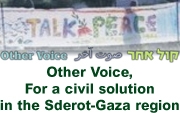“We can live together. As human beings, we are more similar than different.” ~ Dr. Izzeldin Abuelaish, Gaza doctor
At the invitation of American faith and community groups, Common Ground discusses the equal rights goals of the 2005 Palestinian civil society call for boycott, divestment and sanctions (BDS) against Israel until it complies with international law and universal principles of human rights, why it is that all Palestinians refuse to recognize Israel as an ethno-religious “Jewish state,” the “co-resistance” of Palestinians and Israeli Jews opposing Israel’s occupation and apartheid and advocating the creation of one secular democratic state with equal rights for all and protection of minority rights, and concerns and hopes for freedom, justice and equality and lasting peace and security for all in Palestine/Israel.
Because Americans may hold differing political or cultural assumptions regarding a viable solution for justice and peace in Palestine/Israel, Common Ground seeks to respect cultural differences while finding ways to work together. As Jeremy Ben-Ami said at the 2010 J Street Conference: “We want to be open to vibrant, critical debate…. We want to hug and wrestle at the same time.” And as Rabbi Arik Ascherman said at Brandeis University in 2003: “Whatever political solution Israelis and Palestinians choose, I pray we can choose it together.”
By openly discussing our concerns and, at the same time, acting to build cooperation despite our cultural, political or religious differences, we hold fast to the faith and hope that Cecilie Surasky declared in a 2010 Jewish Voice for Peace message promoting divestment from the Israeli occupation: “It is only a matter of time until we are all able to recognize each other’s full humanity, and thereby reclaim our own.” (http://jfjfp.com/12509)
To hasten that day, we take courage from the words of Palestinian Dr. Izzeldin Abuelaish who, ravaged by grief after his three teenage daughters, who had worked for peace with Israeli teens, were killed by Israeli tank shells mistakenly targeting his Gaza home (Gaza doctor’s love and strength endure), wrote a book entitled I Shall Not Hate: A Gaza Doctor’s Journey on the Road to Peace and Human Dignity, and declared of Palestinians and Israeli Jews: “We can live together. As human beings, we are more similar than different.”
Sharing the universal values of American Muslims for Palestine, our “efforts to educate Americans about Palestine and its rich heritage… uphold inherent human rights for all people everywhere and firmly stand against all forms of bigotry and racism…. The struggle for the inalienable rights of Palestinians is categorically opposed to all forms of racism and bigotry, including Islamophobia, anti-black racism, anti-immigrants, anti-Semitism, and other forms of bigotry directed particularly toward people of color and indigenous peoples everywhere” — AMP Anti-Bigotry Statement.
Striving for “a world where we shall call all men neighbors and all countries home” (Rita Rainsford Rouner, Christmas At Sea , 1961) and inspired by people of all faiths who act to strengthen our common humanity, we say: “Let us take from their powerful vision the inspiration to build a broader inclusive world with young and old, every race and religion, and every nationality, that embraces the principles of equality, mutual respect and love.” (Cecelie Surasky, Young, Jewish and Proud, Nov. 2010, http://jfjfp.com/=18953)
Acknowledging this “kairos moment” of truth, grace and opportunity and answering the 2009 call by Palestinian Christians for faith, hope and love “as we face the future, we ask our Jewish… Muslim… Christian… (and all our) brothers and sisters to join us in building bridges that connect rather than walls that separate… join us in the spirit of trust and community… and reach out in love…. Together, we can overcome the fear of ‘the other’ and, together, with all nations and all faiths, build a global society based on trust and compassion.” (www.kairosusa.org)

